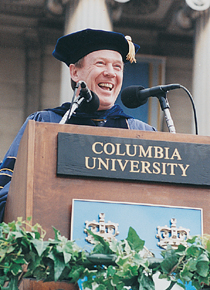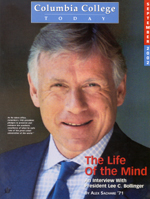 |
 |
 |
 |
|
AROUND THE QUADS
The College’s advising system is receiving further upgrades for the 2002–03 academic year, with assigned advisers, peer advisers and a major new Web site supplementing the work of class deans and departmental faculty to provide students with more personalized service and a wider variety of resources. Dean Austin Quigley has long maintained that, in a complex research university like Columbia, with extensive Core requirements, more than 70 major programs, more than 30 concentrations and hundreds of electives, every student needs several personal advisers, as no one of them can possibly provide a student with the broad range of advice that he or she will need during the course of four years. Currently, students in the first two years can choose a primary adviser from the class deans assigned to their graduation class. Students have, however, indicated a preference for one of the deans being an assigned adviser. The current multiple-source advising system is thus being enhanced to provide such assigned advisers and to extend the range of further advisers and advising resources. Under the new system, each incoming first-year student will be assigned a dean as primary adviser from the newly allied First-Year and Sophomore Class Centers. That dean will remain one of the student’s advisers for two years, at which time the student will be directed to a primary faculty adviser in the department of his or her declared major. The Junior and Senior Class Centers will remain in place to assist students with advising issues that may be more appropriate for a dean than a faculty member. In addition, a pilot peer-advising program, instituted in several departments last spring, is to be expanded after favorable reviews from students. Peer advisers are upperclass students trained to supplement the services to newly declared majors provided by faculty members and to represent students’ further advising needs to the faculty.
The success of these initiatives and of other advising resources already in place will be monitored in the annual Enrolled Student Survey, which continues to assist the College’s efforts to upgrade annually the quality of student services in general. To visit the new Web site, go to http://www.college.columbia.edu/advising. |
|
||||||||||||||||||||||||||||||||||||||||||||||||||


